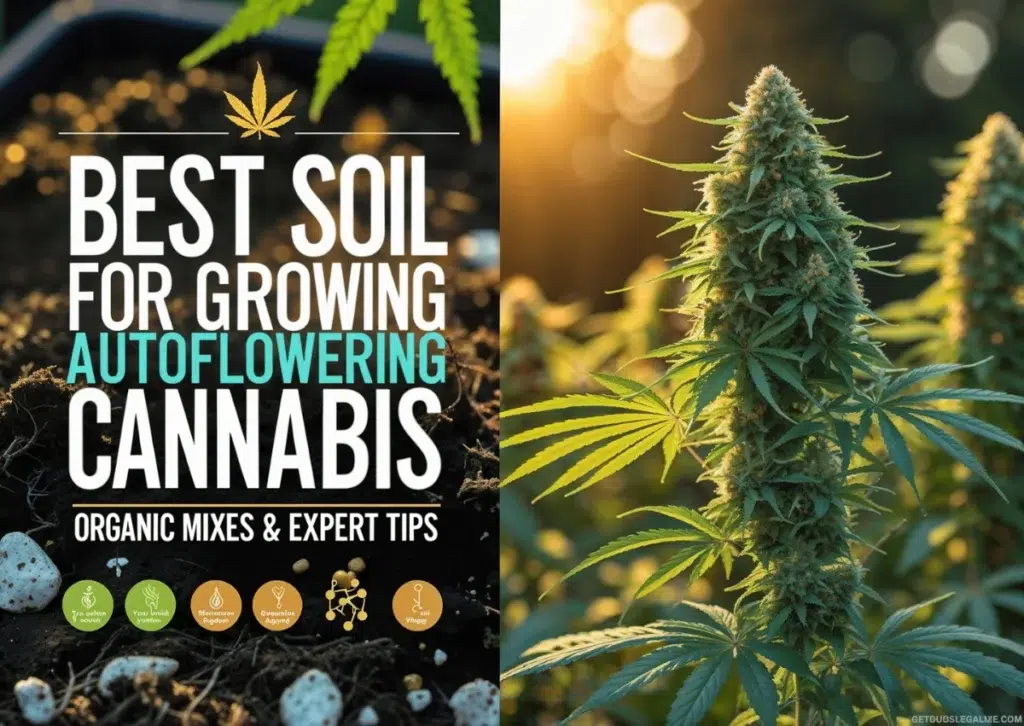How to Make Insecticidal Soap for Marijuana
If you are a cannabis grower, you know how frustrating it can be to deal with pests that attack your plants. You want to protect your crops from damage, but you also want to avoid using harsh chemicals that can harm your health, your plants, and the environment. That’s why insecticidal soap is a great option for natural pest control.
In this blog post, we will explain what insecticidal soap is, how it works, which pests it protects against, and how to make your own at home.
What Is Insecticidal Soap?
Insecticidal soap is a simple and effective way to kill soft-bodied insects that feed on your cannabis plants. It is made from a mixture of water, soap, and oil, and it works by disrupting the cell membranes of the insects, causing them to dehydrate and die.
Unlike synthetic pesticides, insecticidal soap is biodegradable and non-toxic to humans, animals, and beneficial insects. It also does not leave any residue on your plants or soil, so you can harvest your buds without worrying about contamination.
How Does Insecticidal Soap Work?
Insecticidal soap works by contact, meaning that you have to spray it directly on the pests that you want to eliminate. It does not have any residual effect, so you have to reapply it regularly until you get rid of the infestation.
The soap molecules penetrate the waxy coating of the insects’ exoskeletons and interfere with their cellular functions. The oil in the mixture helps to spread the soap and increase its effectiveness. The water acts as a carrier and dilutes the soap to prevent damage to your plants.
Which Pests Does Insecticidal Soap Protect Against?
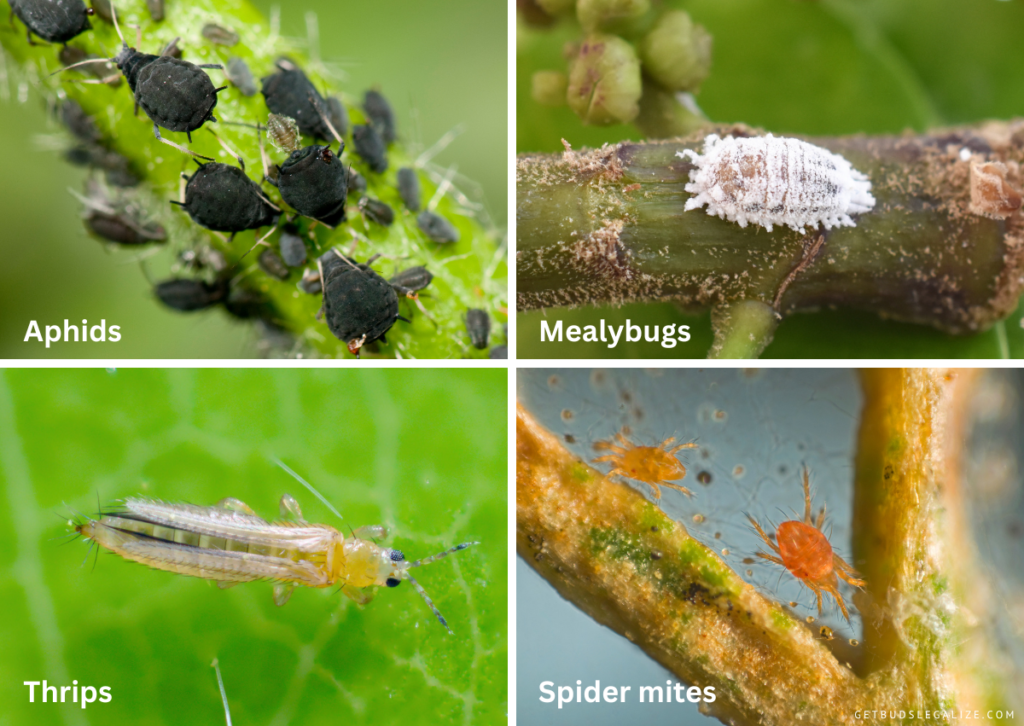
Insecticidal soap is especially effective against soft-bodied insects that suck the sap from your cannabis plants. These include:
- Aphids: These are small, pear-shaped insects that come in various colors and cluster on the undersides of leaves and stems. They can cause yellowing, curling, and distortion of leaves, as well as transmit viruses and fungal diseases.
- Mealybugs: These are white, fluffy insects that look like cotton balls. They feed on the sap and secrete a sticky substance called honeydew, which attracts ants and molds.
- Thrips: These are tiny, slender insects that have fringed wings and feed on plant cells. They can cause silvering, stippling, or scarring of leaves, as well as deform flowers and buds.
- Spider mites: These are microscopic arachnids that spin fine webs on the undersides of leaves and suck the chlorophyll from plant cells. They can cause yellowing, browning, or speckling of leaves, as well as reduce plant vigor and yield.
Is Insecticidal Soap Safe for You and Your Garden?
One of the main advantages of insecticidal soap is that it is safe for your garden and the environment. It does not harm beneficial insects such as bees, ladybugs, or lacewings, as they have a hard exoskeleton that protects them from the soap. It also does not affect birds, mammals, or aquatic life, as it breaks down quickly in water and soil.
However, you should still be careful when using insecticidal soap, as it can irritate your skin, eyes, or respiratory system if you inhale or touch it.
How To Make Insecticidal Soap Concentrate
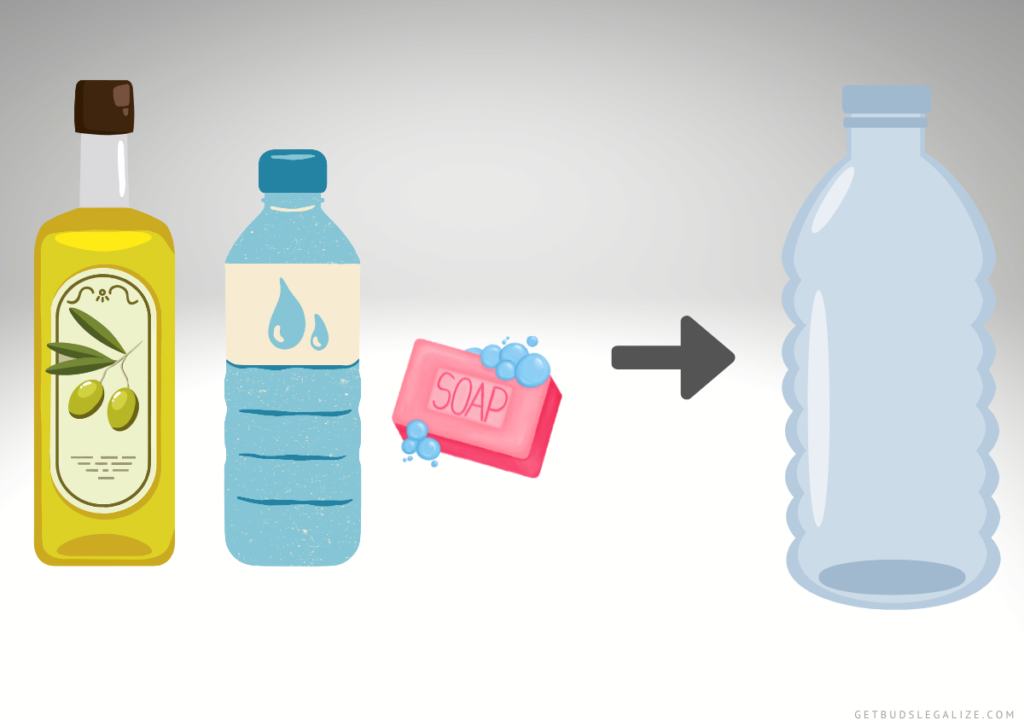
Making insecticidal soap for marijuana is easy and cheap. You only need a few ingredients that you probably already have in your home.
Here is what you need:
- 5l plastic bottle
- Stirring stick
- Spray bottle
- 2½ tbsp. pure liquid soap (without fragrances or artificial colors)
- 2½ tbsp. vegetable oil
- 4l water
To make your insecticidal soap, follow these steps:
Step 1: Fill the plastic bottle with water and leave some space at the top.
Step 2: Add the liquid soap and the vegetable oil and shake well to combine.
Step 3: Label the bottle as “insecticidal soap” and store it in a cool and dark place.
How to Use Insecticidal Soap on Your Plants
To use your insecticidal soap for marijuana effectively, follow these tips:
- Dilute 1 part of the concentrate with 10 parts of water in the spray bottle.
- Spray it early in the morning or late in the evening when the temperature is cooler and the sun is not too strong.
- Spray it thoroughly on all parts of the plant where you see pests or signs of damage.
- Repeat the application every 5 to 7 days until you get rid of the pests.
- Test the spray on a small area of the plant before applying it to the whole plant, to make sure it does not cause any damage or burn.
- Wash your hands and equipment after using the spray.
Insecticidal Soap vs Neem Oil: Which One Is Better?
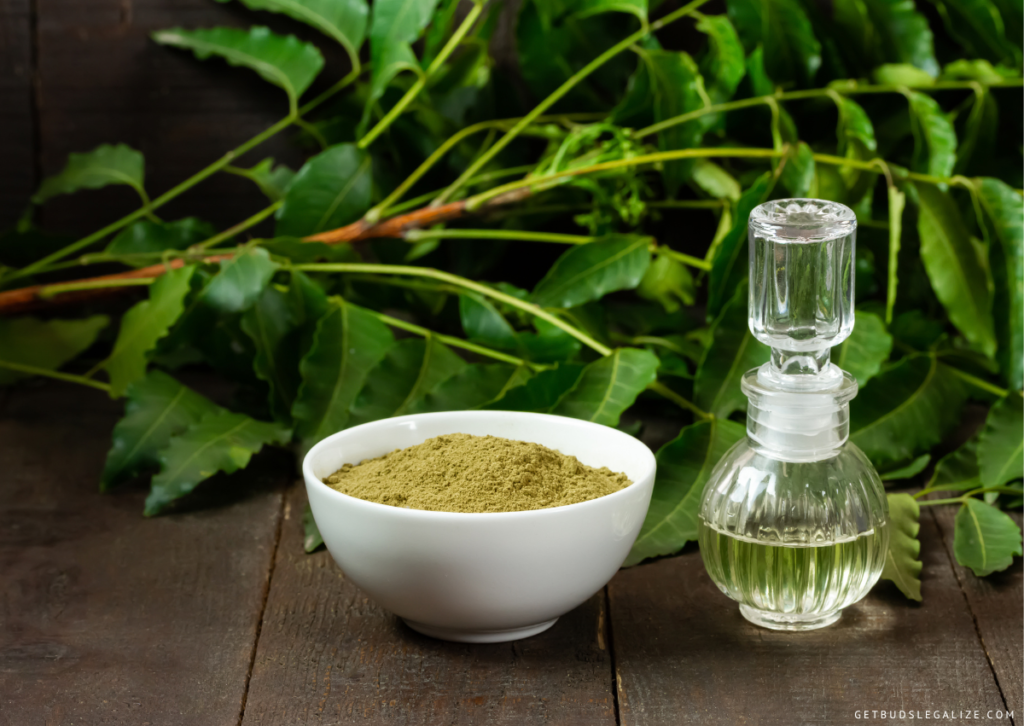
Another natural pesticide that you can use for your marijuana plants is neem oil. Neem oil is extracted from the seeds of the neem tree, a native plant of Southeast Asia and India. It has insecticidal, fungicidal, and antibacterial properties, and it works by disrupting the hormonal system of the insects, preventing them from feeding, mating, or laying eggs. Neem oil also has a residual effect, meaning that it stays on the plant for a longer time and continues to repel pests.
However, neem oil also has some disadvantages. It has a strong smell that some people find unpleasant, and it can affect the taste and aroma of your buds if you use it too close to harvest. It can also harm beneficial insects if you spray it directly on them, and it can be toxic to fish and aquatic life if it gets into water sources. Moreover, neem oil can be more expensive and harder to find than insecticidal soap.
Insecticide Soap Is The Right Way to Protect Your Organic Cannabis Grow
Insecticidal soap is a simple, effective, and environmentally friendly way to protect your weed plants from pests. It’s easy to make at home with common ingredients and won’t harm your health, your plants, or the environment.
However, you must use it regularly and carefully; Alternatively, you can also use neem oil as an alternative natural pesticide, but be careful of its smell, taste, and toxicity. We hope this blog post helped you learn how to make insecticidal soap for cannabis and how to use it effectively. Happy growing!
FAQs about Insecticidal Soap for Marijuana
Neem oil and insecticidal soaps are both effective and natural ways to control aphids on your plants. However, there are some differences between them.
Neem oil is a vegetable oil extracted from the seeds of the neem tree, a tropical plant native to India. It contains a compound called azadirachtin, which acts as an insect repellent and disrupts the growth and reproduction of insects. Neem oil also has antifungal and antibacterial properties, which can help prevent diseases in your plants.
Some of the pros of neem oil are:
- It has a long-lasting effect and can prevent aphids from returning for up to two weeks after application.
- It can also control other pests like spider mites, whiteflies, caterpillars, and fungus gnats.
- It can boost the immune system of your plants and make them more resistant to stress and diseases.
Some of the cons of neem oil are:
- It has a strong and unpleasant smell that can linger on your plants and your grow room.
- It can be toxic to beneficial insects like bees and ladybugs if applied in high concentrations or during their active hours.
- It can be harmful to humans and animals if ingested or inhaled in large amounts.
Insecticidal soap, as we have seen, is a simple solution made from water, liquid soap, and optionally some vegetable oil or alcohol. It kills aphids by dehydrating them and disrupting their cell membranes.
Some of the pros of insecticidal soap are:
- It is cheap and easy to make at home with common ingredients.
- It is safe and eco-friendly, as it does not leave any harmful residues on your plants or the environment.
- It does not affect the taste or quality of your buds.
Some of the cons of insecticidal soap are:
- It has a short-term effect and needs to be reapplied frequently to keep aphids away.
- It can only kill aphids on contact, so it may not reach all the hidden ones on your plants.
- It can damage your plants if used incorrectly or excessively.
Spider mites are tiny arachnids that feed on the sap of your cannabis plants, causing yellow spots, webbing, and eventually death. They are one of the most common and annoying pests that cannabis growers face. Neem oil and insecticidal soap can both help you get rid of them, but they have some differences that you should consider before choosing one over the other.
Neem oil is a vegetable oil that contains azadirachtin, which repels and disrupts the growth and reproduction of insects. Neem oil also has antifungal and antibacterial properties, which can help prevent diseases in your plants.
Some of the pros of neem oil for spider mites are:
- It can prevent spider mites from laying eggs and hatching new generations.
- It can also control other pests like aphids, whiteflies, caterpillars, and fungus gnats.
- It can boost the immune system of your plants and make them more resistant to stress and diseases.
Some of the cons of neem oil for spider mites are:
- It has a strong and unpleasant smell that can linger on your plants and your grow room.
- It can be toxic to beneficial insects like bees and ladybugs if applied in high concentrations or during their active hours.
- It can be harmful to humans and animals if ingested or inhaled in large amounts.
Insecticidal soap is a simple solution made from water, liquid soap, and optionally some vegetable oil or alcohol. It kills spider mites by dehydrating them and disrupting their cell membranes.
Some of the pros of insecticidal soap for spider mites are:
- It is cheap and easy to make at home with common ingredients.
- It is safe and eco-friendly, as it does not leave any harmful residues on your plants or the environment.
- It does not affect the taste or quality of your buds.
Some of the cons of insecticidal soap for spider mites are:
- It has a short-term effect and needs to be reapplied frequently to ensure complete eradication.
- It can damage your plants if used in excess or under direct sunlight, as it can burn the leaves and flowers.
- It can be less effective against some strains of spider mites that have developed resistance to it.
Yes, you can use it, as it does not affect the quality or taste of your buds. However, you should be careful not to spray too much on the flowers themselves, as this can reduce their resin production and potency. You should also rinse off any excess soap from your buds before harvesting them.
Yes, you can mix neem oil and insecticidal soap to create a more potent solution that combines the benefits of both. However, you should be careful not to use too much of either ingredient, as this can harm your plants or reduce their effectiveness. A good neem oil insecticidal soap recipe is:
- 1 gallon of water
- 2 tablespoons of liquid soap
- 1 teaspoon of neem oil
Mix well and spray on your plants as usual. You can also add some alcohol or vegetable oil for extra sticking power.
ILGM Plant Protector
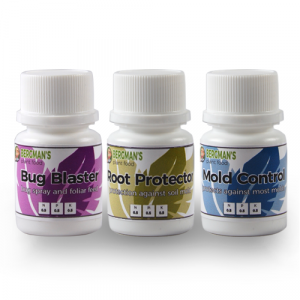
- Protect your cannabis from diseases and harmful pests.
- Contains three 20 ml bottles.
- Enough supplies to protect 20 plants.
- It can be used in soil, hydroponic, and all other growing mediums.
ILGM Fertilizer
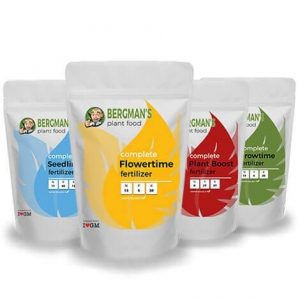
- From seedling to harvest, give your plants everything they need.
- Enough for feeding at least 5 plants.
- Discounted Package Deal
- Works well in soil, hydroponics, and other growing mediums.
- The best way to treat your plants








